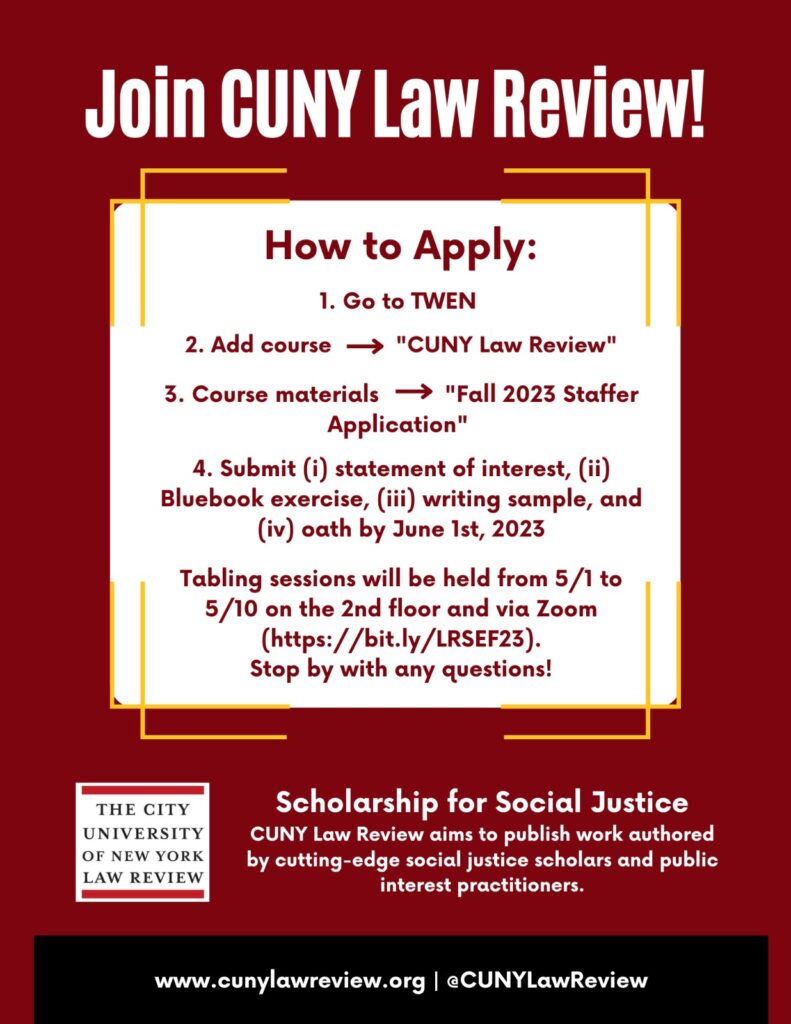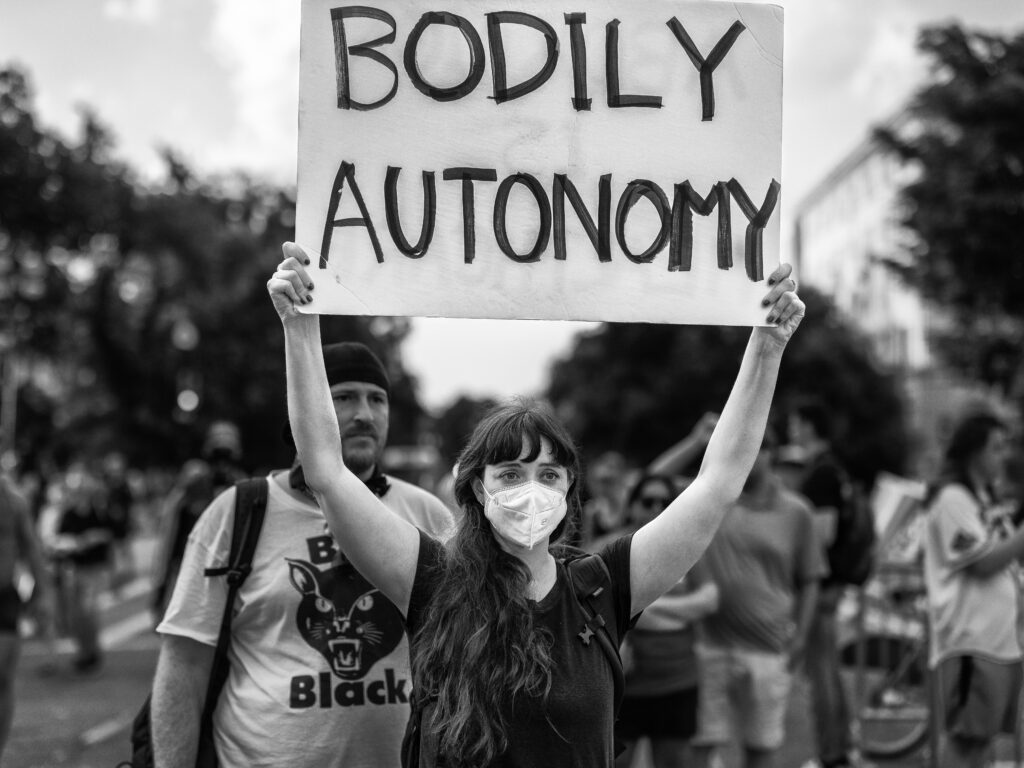Nick Leiber
On May 12, CUNY Law School graduate Fatima Mohammed gave a roughly 13-minute commencement speech to her graduating class as a student-selected speaker at CUNY Law’s graduation ceremony. In it, she shared reflections, offered gratitude, and criticized Israel, the New York Police Department, and the legal system itself. Despite her words clearly meeting First Amendment speech protections, a bullying campaign led to a torrent of negative coverage in right-wing media characterizing her words as antisemitic, calls for depriving CUNY Law of public funding, and public concerns for her safety.
2024 Symposium
“Destroying Democracy from the Inside Out: Legislative, Judicial, and Executive Attacks on the Administrative State”
CALL FOR PAPERS
From the emergence of the major question doctrine and attacks on Chevron deference to the defunding of administrative agencies and the politicization of ALJs, the administrative state is under attack by every branch of the government. For a special Symposium Edition, the CUNY Law Review seeks to publish radical scholarship that addresses the deterioration of American democracy through threats to/the dismantling of the administrative state.
We are looking to publish several short pieces (2-10 pages double-spaced) on legislation, executive orders, and court decisions that undermine the administrative state as a way to stymie justice efforts and the (perhaps few) instances where they work to protect the administrative state. Potential lenses through which we hope to address this issue are: environmental justice, land use, Indigenous rights, labor rights, family law, immigration, and poverty. In keeping with CUNY Law Review’s overall mission, we encourage authors to address this topic from a critical standpoint that highlights issues of systemic racism and injustice.
In addition to submission of a written piece for the Symposium Edition, we are interested in inviting authors to participate in panels at the CUNY Law Review’s 2024 Symposium. If you have a piece that is ready, in the works, or that you are interested in developing that fits within this topic, please reach out to:
Symposium Editor Arpita Vora at arpita.vora@live.law.cuny.edu as soon as possible and no later than September 15, 2023 with a submission or abstract as well your resume or CV.
We welcome contributions from legal academics, practitioners, students, and organizers.
The City University of New York (CUNY) School of Law is one of the nation’s leading public interest law schools and prepares hundreds of attorneys every year to fight for social justice. The CUNY Law Review is an independent, student-run publication devoted to producing public interest scholarship and recognized as one of the leading civil rights journals in the country.
CUNY Law Review Statement on Last Week’s Supreme Court Rulings
Last week, the United States Supreme Court released a series of critical decisions on ending affirmative action in higher education programs—other than military academies—, blocked student loan forgiveness, and expanded a business owner’s right to refuse services to same-sex couples. Continue reading
Learn More About Joining CUNY Law Review

Fellow CUNY Law students,
We encourage you to pause from studying for finals to scream into the wind and learn more about joining us this fall as staff editors working together on social justice scholarship.
You can stop by our tabling sessions on the second floor of the law school from May 1 through May 10 or join us on Zoom by clicking https://bit.ly/LRSEF23. Staffing permitting, we will be at the tabling sessions and on Zoom from 12:30-1:30 pm and 5:45-6:45 pm.
Applications are due by June 1. We look forward to chatting!
Volume 26.1
We are excited to publish Volume 26.1. The full journal is available at CUNY Academic Works. Please see below for individual articles:
Articles
Extradition in Post-Roe America
Alejandra L. Caraballo, Cynthia Conti-Cook, Yveka Pierre, Michelle McGrath, Hillary Aarons
High Risk Hustling: Payment Processors Sexual Proxies and Discrimination by Design
Zahra Stardust, Danielle Blunt, Gabriella Garcia, Lorelei Lee, Kate D’Adamo, Rachel Kuo
Notes
Comments
Public Interest Practitioner Section
Reducing Multigenerational Poverty in New York Through Sentencing Reform
Jared Trujillo
Footnote Forum
Reconceptualizing Bodily Autonomy: Forging Radical Politics of Life and Livelihood
Chaumtoli Huq

“There is no such thing as a single-issue struggle because we do not live single-issue lives. Our struggles are particular, but we are not alone.”
Register Now for the CUNY Law Review Symposium on Bodily Autonomy
Join us on April 1, 2023, for the CUNY Law Review Symposium, More Than Just a Pipe Dream: Re-imagining Bodily Autonomy. This is a CLE-certified event exploring the recent legal developments in reproductive health care and legislation adversely affecting transgender communities, and discussing what legal advocates should do. Registration is now open.
Student Note on Section 230 Cited in Supreme Court Amicus Brief
On Feb. 21, 2023, the Supreme Court heard arguments in Gonzalez v. Google and Twitter Inc., v. Taamneh, a set of companion cases which turn on the question of whether social media platforms can be held liable for hosting harmful terrorist material. CUNY Law Student Val Rigodon (‘22) wrote a note in our 25.2 issue that was cited in the amicus brief submitted by Tennessee and other states.
Constructing Immorality: Abortion and Family Policing
Jasmine Wali
When Roe v. Wade was overturned, advocates across the political spectrum declared that the foster care system would be overwhelmed by an influx of “unwanted” children. Adoption became a central talking point. Anti-abortion proponents stated that adoption was a solution for these families, and that foster and adoption systems needed to be strengthened. Supporters of reproductive choice pointed out the seeming hypocrisy of the “pro-life” movement by highlighting all the children awaiting adoption in foster care.
Roe Is Gone. What Happens for Trans Men?
Elias Fox Bova Schmidt
When the Dobbs v. Jackson Women’s Health Organization decision was leaked on May 2, 2022, I was sitting at my desk, studying for my final exam in my last semester of law school. I had just accepted a fellowship at a reproductive justice organization but I knew that, as a trans man, I was somewhat out of place. I had already felt the hesitancy from many within the reproductive rights landscape to acknowledge that, like cisgender women, trans men require safe and legal access to abortion. As soon as I got the Twitter notification about the leak, I knew that trans men would be among some of the first communities to be further erased in the reactions to the decision.
